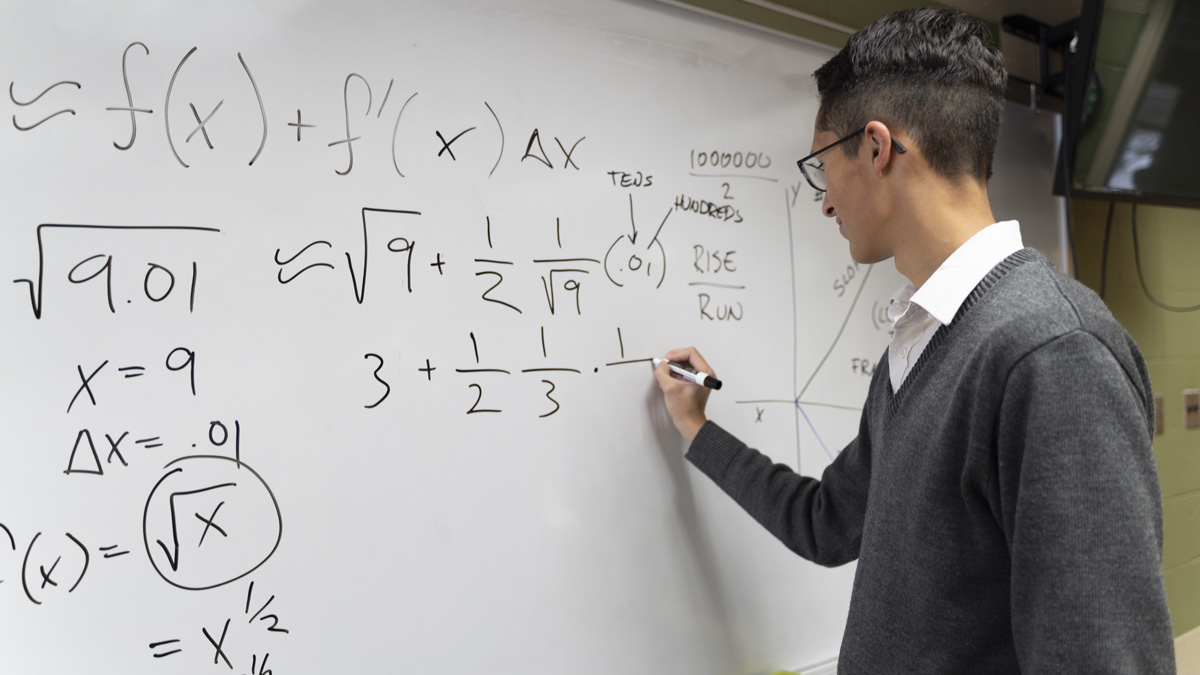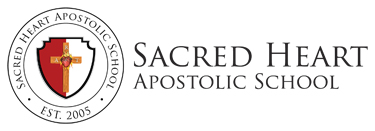
Advanced Literature
This advanced literature course is comparable to AP English Language and Composition, the purpose of which “is to enable students to read complex texts with understanding and to write prose of sufficient richness and complexity to communicate effectively with mature readers” (College Board, 2010). This course also includes elements of poetry and public speaking, so that students may become astute at understanding and implementing all forms of communication.
The course is intended to provide students with an academic experience parallel
to that of a college level literature course. Students learn to become active readers, able to analyze and interpret textual detail in a variety of rhetorical contexts. At the same time, a thorough writing component focusing on expository, analytical, argumentative, and creative writing enables students to mature as effective communicators.
Calculus
Calculus topics studied follow closely the AP Calculus AB course guide, which would prepare students for post-secondary work in physics, chemistry, engineering, and economics. The derivative (a mathematical way to study rates of change) and the integral (a mathematical way to study the accumulation of changing quantities) are the mathematical models of ideas connected by the fundamental theorem of calculus. Functions are the rules used to find and describe how one thing uniquely corresponds to another. Students learn to quantify how things change over time and the cause-and-effect relationships that exist among things in the universe, i.e., physical, social, and economic situations.
Physics
This course is about the science of motion, the mathematical description of it, its causes, and its effects. It will include both graphical and algebraic analysis of moving objects. A couple of calculus-based applications will be used for labs. Skill will be developed in the use of equation manipulation and problem solving. A few well-chosen laboratory experiments will help solidify what is learned in the classroom. Mechanics will be the main focus of the curriculum. Such classical topics as velocity and acceleration, projectile motion, vector calculation of actual motion, forces and movement, gravity, and momentum as well as work, energy, and simple machines. Various topics in astronomy will be covered through documentaries, visiting a local digital planetarium as well as participating in astronomical events as they occur.
Government and Economics
This course introduces students to early American political thought and its crowning political achievement, the United States Constitution. Focusing on The Federalist Papers and other original source documents from the Founding period, students learn basic American political concepts such as natural rights, social compact theory, and religious liberty as well as constitutional features such as limited government, separation of powers, and the rule of law. By studying the Constitution, students will understand better the nature of political justice and the serious challenges, especially those represented by the Civil War and the rise of progressivism, in preserving “the American experiment of self-government under law.” World governments and their relationships to their citizens are also explored.
Students are also introduced to the practical application of economic theory by studying the economic models of the past and comparing how they continue to fare in real world situations. Communist and socialist models are compared and contrasted with supply and demand side economic theory framed within the scope of free market capitalism.
Western Civilization
This course will trace the major evolutions of thought in western civilization from the ancient world to the present. Beginning with Democracy in Greece and Republicanism in Rome, and continuing with Judeo-Christian tradition, the rise of universities in the Middle Ages, the rediscovery of classical influences during the Renaissance, and the explosion of science and political theory during the enlightenment, students will incorporate their class experience into a critical analysis of the American experiment of self-government under law.
This course is designed to give students an introduction to the personalities who shaped Western Civilization. By examining the influence great thinkers have had on the world and reading excerpts from their contributions to the canon of western literature, students will gain an insight into the past which will help them to understand the world’s present dilemmas and equip them more thoroughly for employing tested solutions to solve problems in the future.
Philosophy
In this course, the seniors and their professor will embark upon a journey to navigate the terrain of Christian philosophy. This class will serve as an introduction to stir within each one of the students a desire to search for and find truth—whether that be the truth of philosophy, theology, science, mathematics, or any other discipline. Furthermore, in this course Christian philosophy is precisely what they are going to do, viz. engaging in philosophy both under the influence of Christian faith as a guiding and ennobling light, but also ordered toward the possibility of integrating that knowledge into their understanding of and explanation of the Faith. Thus, for example, students will study Ancient, pre-Christian philosophers, but insofar as their early searches for truth have been and still are helpful for the development of Christian philosophy and for the understanding and explanation of the Faith. While students will be focusing on philosophy, this task will always be in light of the fact that philosophical truth and theological truth are friends and allies.
Part 1 of the course is the historical section. The teacher will begin with a general introduction to the course with philosophical principles and terminology, followed by treatments of Ancient, early Christian, Medieval, and Modern philosophers with an eye toward the re-occurring philosophical problems of these periods. Part 2 is the systematic section in which students will examine the general principles of several Christian, philosophical disciplines: Logic, Epistemology, Metaphysics, Natural Philosophy, Psychology (in the original, philosophical sense as the philosophical study of the soul), Natural Theology, and Ethics. All of these topics will be presented in Thomistic fashion and in light of Thomistic principles, seeking to form the students in a Living Thomism by which they can take their first steps in philosophizing like St. Thomas when engaging both old and new philosophical problems.
Greek III
Having completed the Basics of Biblical Greek, students are now able to practice their Greek skills by reading and translating the entire Gospel of St. John. More complex points of grammar are addressed as they are encountered in the text. Emphasis is placed on features of New Testament Greek that differ from standard classical usage.
Religion
Apologetics is a defense of the faith, and this course makes the case for Christianity and Catholicism as it addresses some controversies surrounding the faith. It starts by making the case for objective truth and then discusses the relationship between faith and reason using John Paul II’s encyclical Fides et Ratio. Then it goes on to the following topics: the arguments for God’s existence, the evolution and creation debate, debunking the supposed conflict between science and faith (this includes examining the facts around the Galileo case), the problem of evil and suffering and God’s goodness, the resurrection of Jesus Christ, Biblical truth, life after death, the foundation of the Church, Christianity and other religions. The approach is to address present-day criticism of the faith by drawing from arguments used by contemporary authors who defend and make the case for Christianity, thus giving the students tools they can use in daily conversation or with people they meet.
Physical Education
Daily physical education is an essential part of the Sacred Heart Apostolic School program. We believe that sports provide not only the physical and mental rest necessary for the student’s balanced growth but also the opportunity to form character and virtue and to thoroughly enjoy one’s growing abilities. At least one hour a day is allotted for intramural soccer, basketball, hockey, football, volleyball, and other sports.
On alternating Saturdays, the students have a chance to enjoy nature off campus at local parks or work on the grounds around the campus.
Music
The students begin their year-round study of classical music in the Summer Course. They begin with an introduction to the instruments of the orchestra and some musical forms. The course is cyclic and over a three-year span covers the Middles Ages, Renaissance, the Baroque Period, the Classical Period, and the Romantic Period. Audiovisual presentations are the prime medium used to familiarize the students with the music as well as to cultivate an appreciation for the various styles.

